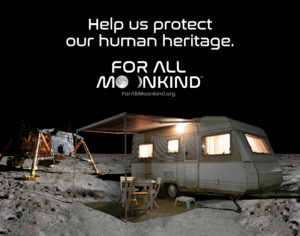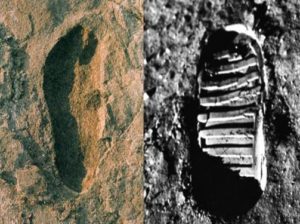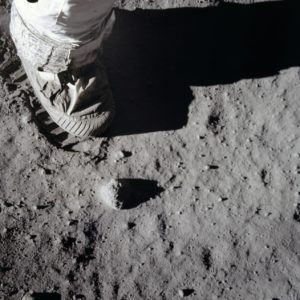The Moon. It was humanity’s first true foray into space. To land on another celestial body – and it captured the imagination of planet Earth. Today, as plans are afoot to go back to our closest neighbour, there is concern that those very first landing sites, those first footprints, could be lost forever if they are left unprotected. The For All Moonkind initiative has been established to ensure that this is something that never happens and that regulations are put into place to protect sites on the Moon and Mars – and future sites. SpaceWatch Middle East COO Torsten Kriening spoke to Michelle L.D. Hanlon to find out more about this fascinating move to safeguard our history in space.
Please tell us more about For All Moonkind and what the initiative is all about.
Thanks so much for the opportunity. We are all about trying to preserve our human heritage in space, starting with the lunar landing sites from the Luna 2 Russian mission to the Apollo landing sites. The idea is that we need to preserve our history in order to preserve our civilisation in space. We firmly believe that human beings belong in space, that our future is in space and that we need to explore space. We have no intention of slowing down our exploration. But we believe that we cannot explore space and continue as a civilisation in space unless we preserve our history there. And that history includes the first steps we made as human-guided rovers and humans on the Moon.
Why don’t we automatically preserve these sites as we already do on Earth?
It is already done on Earth through the UNESCO World Heritage Convention and that is exactly what we are trying to establish in space. However, we cannot take the UNESCO Convention and apply it to space because of the vagaries of international law. The UNESCO convention states quite clearly that if you want to have a site named as a World Heritage Site you can only nominate it if it is within your sovereign territory. In outer space, the Outer Space Treaty specifically says that no sovereign can appropriate any territory in outer space. Therefore, we reach a situation where no nation can nominate a territory as a World Heritage Site because that would be claiming sovereignty, which is illegal. So our proposal is to take the UNESCO World Heritage model and create an outer space model. What we’d like to do is have a convention on Universal Heritage in outer space and to start now, as a tradition, to save things while we can, starting with the Moon and moving on to Mars. Then we must keep in mind, as we explore beyond the solar system into deeper space, this idea of preservation and make sure we keep our history close to us and not lose sight of ourselves as a human species.
What drove you to start this initiative? It is not backed by an organisation or government – you are a group of like-minded people so what drives you to undertake this?
 It is entirely volunteer-based and nobody earns any money from it. There is no compensation for our entire leadership board. We are driven by a deep passion for space. I take it as a given that we are going to go to space and I have spent my entire life going to museums, national parks and some of the most amazing places on this Earth. I wonder and marvel at the incredible talent of human beings. I have two sons who are engineers and I fully expect them to either design the aircraft that will take us to a celestial body or to be on it – or both. I honestly believe that we need to make sure that we remember where we came from, because when the Moon settlement decides to sever ties with Earth and create their own government, they will need a tradition to work from. The way to start that is through preservation, so that there will be a museum or memorial or plaque so that my great grandchildren will see a footprint. That’s how you know there is tradition in your civilisation.
It is entirely volunteer-based and nobody earns any money from it. There is no compensation for our entire leadership board. We are driven by a deep passion for space. I take it as a given that we are going to go to space and I have spent my entire life going to museums, national parks and some of the most amazing places on this Earth. I wonder and marvel at the incredible talent of human beings. I have two sons who are engineers and I fully expect them to either design the aircraft that will take us to a celestial body or to be on it – or both. I honestly believe that we need to make sure that we remember where we came from, because when the Moon settlement decides to sever ties with Earth and create their own government, they will need a tradition to work from. The way to start that is through preservation, so that there will be a museum or memorial or plaque so that my great grandchildren will see a footprint. That’s how you know there is tradition in your civilisation.
I am also driven by a deep belief that the only way we can properly, usefully, successfully exploit space is to do it collaboratively. Right now, as an international community, we have not had an agreement about space since the 1970s. It doesn’t look like anyone is going to come forward and agree on anything about space. Perhaps, because I have not yet met anyone who thinks it’s a bad idea to preserve these sites, this is something that could act as a catalyst to bring everyone to the table to talk about space and maybe, just maybe, we can build better collaboration and better international efforts into space. So I am driven by a naiveté that we can explore space as one.
It sounds like a very philanthropic approach but how realistic is it? We have a lot of private initiatives going into space now – big names and small names like the Google Lunar XPrize competitors. We will see competitors going to the Moon in the next year. NASA does protect the Apollo sites using guidelines so if that is in place today, why do you need to take the next step? Will that hold back private business?
 Absolutely not. You are correct. There are NASA guidelines. There are 90 pages that explain how close you can get to their site, but they are just guidelines and they are not enforceable. There are companies such as PTScientists, who plan on going to the Moon and are willing to abide by the guidelines, who have spoken to NASA and who have planned their entire maiden voyage on the fact that they want to respect every guideline – do everything by the book. Not all companies are like PTScientists. So what we are trying to do is to protect the good actors in the World. PTScientists is taking a lot of time and effort and investment into making sure they do this right. That is money that other companies should be spending to make sure they also do this right. So by creating these preservation procedures and regulations, we are protecting the moral and ethical companies who aren’t going to put their profits above the needs of humanity.
Absolutely not. You are correct. There are NASA guidelines. There are 90 pages that explain how close you can get to their site, but they are just guidelines and they are not enforceable. There are companies such as PTScientists, who plan on going to the Moon and are willing to abide by the guidelines, who have spoken to NASA and who have planned their entire maiden voyage on the fact that they want to respect every guideline – do everything by the book. Not all companies are like PTScientists. So what we are trying to do is to protect the good actors in the World. PTScientists is taking a lot of time and effort and investment into making sure they do this right. That is money that other companies should be spending to make sure they also do this right. So by creating these preservation procedures and regulations, we are protecting the moral and ethical companies who aren’t going to put their profits above the needs of humanity.
In James Cameron’s movie Avatar, the commercial companies destroy heritage sites on another planet and I understand exactly why you say it shouldn’t be done. However, there is a commercial element and the private companies are driving this today – the Bezos and the Musks of the space world. How do you think UNOOSA should respond to that or will they be far behind the reality?
Part of what we’re doing is reaching out to space agencies and national states and to the private companies directly. We are sceptical that the UN can keep up with the private actors at this point. As I said earlier, we haven’t been able to sit at the table as an international community and discuss space law. Our appeal to private companies is to come together with us to talk about how we can preserve these sites and to create a discussion. I would say to them that, just as a baseline, you need regulation in space because if you have no regulations at all you will end up in court and they will spend decades, in jurisdictions all over the world, spending millions and billions of dollars over little things. Let’s put some boundaries up in space to protect your investment. I want our space explorers to spend their money on exploration, not on litigation.
How can I as an individual, as an enterprise, as an agency or government get involved? How would you like to reach out to the public?
We are very young right now. Just 4 or 5 months old. What we would like now is for you to go to our website: www.forallmoonkind.org and join up. We promise not to spam you but we will keep you informed of things that you can do. Support us on Facebook. Follow us on Twitter. The more support we get, the more we can go to more corporations and governments and tell them that we have a large following and this is something you need to get behind. The more support we get, the more we can persuade the big companies and nation states to join us.
 Michelle L.D. Hanlon is a Co-Founder of For All Moonkind, Inc. and a founding partner of ABH Aerospace. A business attorney with more than 25 years of experience, she earned her J.D. magna cum laude from the Georgetown University Law Center and her B.A. in Political Science from Yale College. She received her Master of Laws in Air and Space Law from McGill University where the focus of her research was on commercial space and the intersection of commerce and public law.
Michelle L.D. Hanlon is a Co-Founder of For All Moonkind, Inc. and a founding partner of ABH Aerospace. A business attorney with more than 25 years of experience, she earned her J.D. magna cum laude from the Georgetown University Law Center and her B.A. in Political Science from Yale College. She received her Master of Laws in Air and Space Law from McGill University where the focus of her research was on commercial space and the intersection of commerce and public law.
SpaceWatch Middle East thanks Michelle L.D. Hanlon, Co-Founder of For All Moonkind for the interview.
Original published at: https://spacewatch.global/2017/11/michelle-hanlon-of-for-all-moonkind/
 SpaceWatch.Global An independent perspective on space
SpaceWatch.Global An independent perspective on space

